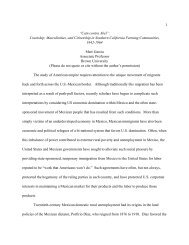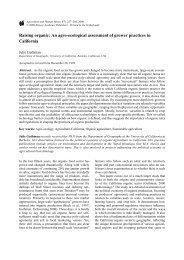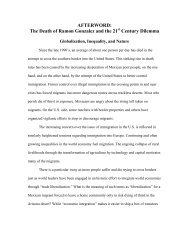DRAFT Please do not cite or publish without permission Information ...
DRAFT Please do not cite or publish without permission Information ...
DRAFT Please do not cite or publish without permission Information ...
Create successful ePaper yourself
Turn your PDF publications into a flip-book with our unique Google optimized e-Paper software.
8<br />
National Party of “Greater Syria”, and the Palestinian resistance movement, with its<br />
numerous netw<strong>or</strong>ked factions, in its early incarnation from the mid-1950s to the late<br />
1960s. Lebanon, the one relatively non-auth<strong>or</strong>itarian Arab state, featured legal parties<br />
and regular elections; yet even here, perhaps owing to Lebanon’s highly plural society,<br />
f<strong>or</strong>mal political parties were weak and m<strong>or</strong>e often than <strong>not</strong> were <strong>or</strong>ganized as inf<strong>or</strong>mal<br />
netw<strong>or</strong>ks of <strong>not</strong>ables and their clienteles, usually within a sectarian <strong>or</strong> regional<br />
framew<strong>or</strong>k. The Lebanese (Maronite) Phalange Party emerged out of a quasi-fascist kind<br />
of youth <strong>or</strong>ganization. The (Druze) Progressive Socialist Party derived its cohesion and<br />
influence from <strong>do</strong>minant family netw<strong>or</strong>ks (the Junblats and Arslans). When the state<br />
collapsed into a long civil war (with significant transnational features) from 1975 to 1990<br />
the Lebanon became a “republic” of netw<strong>or</strong>ked militias.<br />
In the Arabian peninsula, where family and tribal based patrimonial systems<br />
framed the political agenda, political parties were illegal and elections almost nonexistent.<br />
Yet a societal-based traditional pluralism did exist through the inf<strong>or</strong>mal<br />
political netw<strong>or</strong>ks of the diwaniyya in Kuwait, the majlis in Saudi Arabia, and the mafraj<br />
in Yemen. Arabian netw<strong>or</strong>ks were functionally differentiated as well around<br />
occupational (e.g. business), religious, educational, and social concerns. We learned to<br />
our s<strong>or</strong>row, after September 11, of the f<strong>or</strong>midable social capital and netw<strong>or</strong>k flows (in<br />
Castells’ term) that seem to inhere in militant Islamist netw<strong>or</strong>ks.<br />
IV.<br />
Explaining Netw<strong>or</strong>k Success: The Particular Case of Islamist Netw<strong>or</strong>ks<br />
Islamist netw<strong>or</strong>ks indeed seem to be particularly successful. There are four<br />
research questions that might help explain why this is the case, questions, however, that<br />
could be asked about netw<strong>or</strong>k political <strong>or</strong>ganizations in general in the Arab east. First,<br />
how potent and socially pervasive is the symbolic content of the value agenda that their<br />
leaders frame Second, how <strong>do</strong> they recruit, retain, and deepen the commitment of<br />
members of the netw<strong>or</strong>k Third, to what extent can they build upon and benefit from<br />
existing kinship, occupational, educational <strong>or</strong> financial netw<strong>or</strong>ks And fourth, <strong>do</strong>es the<br />
Inf<strong>or</strong>mation Technology revolution allow political netw<strong>or</strong>ks to extend their reach beyond<br />
face-to-face relationships; <strong>or</strong> to put it a<strong>not</strong>her way, can social capital (and trust) travel<br />
through cyberspace<br />
This is <strong>not</strong> the place to try and answers these questions exhaustively. But a casual<br />
survey of f<strong>or</strong>mal Islamist political netw<strong>or</strong>ks like the Organization of the Islamic<br />
Conference, and less f<strong>or</strong>mal <strong>or</strong> even clandestine movements such as the Egyptian<br />
gama’at, the Shi’a netw<strong>or</strong>ks of Lebanon, Iran and Iraq, the Palestinian Islamist groups,<br />
similar <strong>or</strong>ganizations in N<strong>or</strong>th Africa, and even the <strong>not</strong><strong>or</strong>ious Al-Qa’ida suggests that on<br />
all counts they can advance their agendas. First, with respect to the symbolic agenda, one<br />
<strong>do</strong>es <strong>not</strong> have to go so far as some auth<strong>or</strong>s and claim that the whole discourse of<br />
contemp<strong>or</strong>ary Arab politics has become Islamicized to observe that the array of programs<br />
and projects encapsulated by the slogan “Islam is the Solution” resonates deeply with<br />
individuals mired in the tensions and contradictions of contemp<strong>or</strong>ary Arab societies.<br />
M<strong>or</strong>eover, the pervasiveness of these symbols, especially when associated with<br />
longstanding nationalist concerns extends throughout society and is <strong>not</strong> simply the





